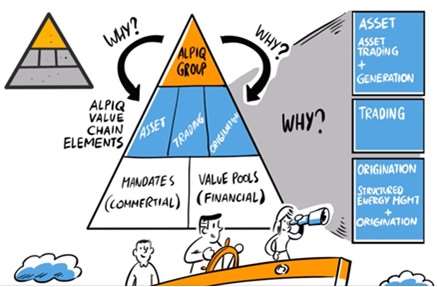Introduction
Alpiq’s activities and material topics
What do we do, and where?
Alpiq is a leading Swiss energy company that is active in various countries and markets throughout Europe. Our energy business contributes to a better climate and improved security of supply for our customers and partners in Switzerland and on the European markets. We pursue a sustainable, financially sound and risk-adjusted business model.
Alpiq’s core business in Switzerland is the production of electricity from flexible CO2-free hydropower and from nuclear power as well as from wind power and photovoltaics. Internationally we operate wind power and photovoltaic plants in several European countries as well as modern and flexible gas-fired combined-cycle power plants in Italy, Spain and Hungary. By producing green hydrogen, we are pioneers in contributing to CO2-free heavy-duty traffic and are continuously expanding our competence.
As a major power producer and supplier our core business necessarily comprises energy trading. We sell production from our own plants as well as third-party plants on and procure electricity, gas and other energy products in many European countries. A sustainable and cost-effective energy procurement strategy is an important aspect of any business. Our sales & origination teams support industrial and business customers with sustainable energy management as well as a wide range of energy solutions and services.
In many European countries, Alpiq operates in energy trading and sales & origination as well as energy services through a subsidiary and offers its products and services largely to industrial and business customers. In France, Alpiq has also been active in retail business for electricity customers since 2020.

How did we determine which topics are material?
In order to determine Alpiq’s material economic, environmental and social topics, an approach based on the “double materiality“ of impacts and related topics was chosen. This means that Alpiq’s potential negative and positive impact on economic, environmental and social topics (inside-out view) was taken into account. Likewise, the impact of these topics and climate change on Alpiq and its business (outside-in view, financial impact) were considered.
A list of topics related to Alpiq’s potential areas of influence was drawn up. These included topics from Alpiq’s previous sustainability reports, from Alpiq’s sustainability framework (see “GRI 2-22: Statement on sustainable development strategy”) and from feedback from interviews with stakeholders (see “GRI 2-29: Approach to stakeholder engagement”).
The potential impact areas and corresponding topics from the longlist were combined into a shortlist of 13 potentially material topics. These were reviewed and prioritized using the results of the direct stakeholder and expert interviews.
The material topics were linked to the five UN Sustainable Development Goals (SDGs), on which Alpiq has the greatest impact. Alpiq decided to focus on the following five SDGs in the next couple of years:

The 13 economic, environmental and social topics, each of which is linked to one or two of our five SDGs, are presented in the figure below. They form the basis for the scope of the information presented in Alpiq’s third sustainability report.
Three topics have been added to this report that were only mentioned in last year’s report. This year they are described in more detail:
• Economic: Security of supply
• Environmental: Biodiversity
• Social: Diversity & equal opportunity
In 2022, the topics “GRI 419: Socioeconomic compliance” and “GRI 307: Environmental compliance” were included in the new “GRI 2-27: Compliance with laws and regulations”.
Alpiq has prepared its Sustainability Report for the current reporting year in accordance with the Global Reporting Initiative (GRI) core option. As in 2021, the report is also limited to the fully consolidated units of the Alpiq Group for 2022.
The exception is the topic of nuclear energy. Alpiq holds direct shareholdings in Swiss nuclear power plant companies and long-term supply contracts with French nuclear power plants. However, because this topic is of great importance to the Alpiq Group, the issue of nuclear power plants is covered again. Minority interests are also taken into account for the greenhouse gas calculation.